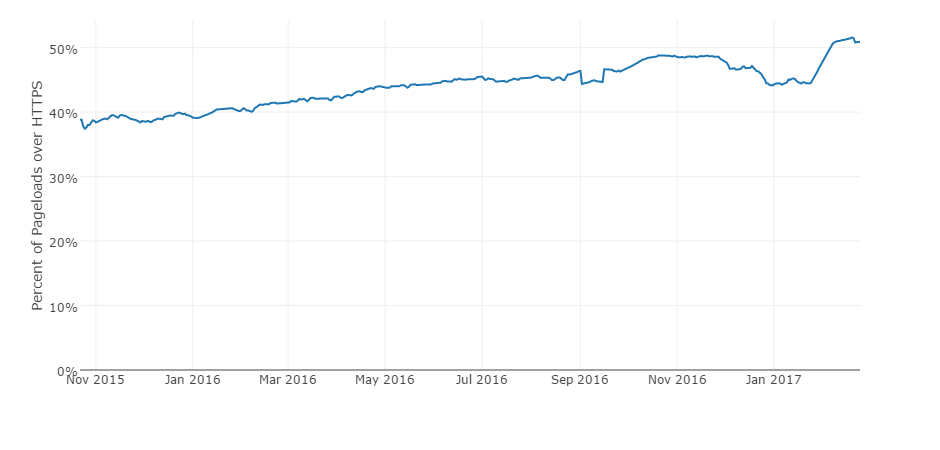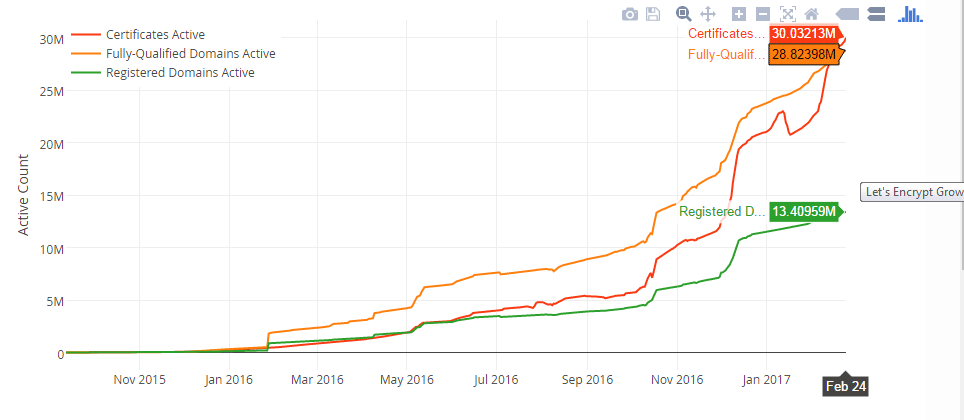EFF: we are halfway to safe internet

Governments of different countries are making efforts to control citizens and monitor the entire Internet. The only way to preserve freedom is to securely encrypt all connections. The global movement to encrypt the entire Internet has announced an important milestone. Around the beginning of February 2017, the share of HTTPS-protected Internet traffic for the first time exceeded 50% . Russia leads the world in HTTPS traffic growth rates.
Thus, according to the Electronic Frontier Foundation, we are halfway to a secure Internet, protected from wiretapping, content spoofing, theft of cookies and censorship. Against all these malicious phenomena, HTTPS protects.
At the end of January 2017, Mozilla reported overcoming the milestone of 50% of encrypted traffic . A little bit laterThis was confirmed by Firefox telemetry , which is calculated as a moving average over the past 14 days. According to telemetry, the two-week moving average overcame the 50% mark on February 6, 2017. If on February 5 the value was 49.98875%, then on February 6 it was 50.37423%.

In February 2017, the share of encrypted traffic on the Internet for the first time exceeded 50%, Firefox telemetry data
For the last day when Firefox statistics are available, February 24, 2016, the moving average is 50.88921%.
It could be assumed that Firefox users are slightly more advanced than regular users, they often go to good sites with HTTPS support, but statistics from the most popular Chrome browser in the world confirm these conclusions: Now more than half of web traffic is protected by HTTPS under all operating systems except Android.
Latest statistics for February 18, 2017:
- Chrome OS: 71%
- Mac OS: 66%
- Linux: 57%
- Windows: 56%
- Android: 49%
Typically, the share of secure traffic in some countries is growing faster than in others. For example, in Russia it grows much faster than in Japan. Over the past two years, this share of HTTPS for Windows in Japan has grown from 23% to 37%, in Russia - from 28% to 55%, in the USA - from 44% to 65%.
In recent years, under pressure from the public, many large sites have switched to using HTTPS by default. This was done by Facebook, Twitter and Wikipedia. Then Google put pressure on everyone else, starting to consider HTTPS as a ranking factor in search results in August 2014. Chrome browser for non-HTTPS sites has a special security messagesince January 2017. Perhaps this, in particular, explains some surge in the popularity of HTTPS in January-February 2017, noticeable on the charts. Users are beginning to realize that the lack of cryptographic protection of traffic is a threat to their security by the government and other agents who seek to wiretap and intercept traffic. In order not to lose their audience, websites are forced to install free certificates and slightly increase the load on their servers, encrypting traffic.
The Safe Web movement has been joined by some community organizations and the media. For example, the Free Frontier Foundation periodically publishes the Encrypt the Web report on the status of encryption on the Web. The same encryption reports appeared on media sitesSecure the News and encryption on government Pulse sites . For example, 74% of US government sites have already switched to HTTPS.
An important role in the practical implementation of HTTPS was played by the free Let's Encrypt certificate authority, as well as the Certbot tool , which allows you to get a free Let's Encrypt certificate and automatically configure it for your server. The popularity of Let's Encrypt is growing rapidly to date. In October 2016, it became the largest certification center in the world with 12 million certificates, and now the number of certificates has exceeded 28 million.

A significant part of this growth was achieved thanks to the transition to Let's Encrypt of many large hosting and site hosting platforms such as WordPress.com, Squarespace, Digital Ocean, Dreamhost.com, OVH.com, SiteGround.com and dozens of others .
Recall that according to the package of laws of Yarovoy-Ozerov, the Russian state wants to record and store all user traffic for a long time. Well, now more than half of this traffic will be encrypted.
